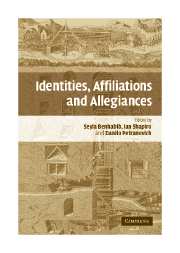Book contents
- Frontmatter
- Contents
- List of figures
- List of tables
- List of contributors
- Editors' introduction
- Part I Emergence and limits of national political identities
- Part II Multiple identities in practice: the European example
- Part III Decoupling citizenship from identity
- Part IV Identity and historical injustice
- 12 Social solidarity as a problem for cosmopolitan democracy
- 13 The continuing significance of ethnocultural identity
- 14 Amnesty or impunity? A preliminary critique of the Report of the Truth and Reconciliation Commission of South Africa
- 15 Law's races
- References
- Index
15 - Law's races
Published online by Cambridge University Press: 05 June 2012
- Frontmatter
- Contents
- List of figures
- List of tables
- List of contributors
- Editors' introduction
- Part I Emergence and limits of national political identities
- Part II Multiple identities in practice: the European example
- Part III Decoupling citizenship from identity
- Part IV Identity and historical injustice
- 12 Social solidarity as a problem for cosmopolitan democracy
- 13 The continuing significance of ethnocultural identity
- 14 Amnesty or impunity? A preliminary critique of the Report of the Truth and Reconciliation Commission of South Africa
- 15 Law's races
- References
- Index
Summary
Toward a historical–institutional theory of identity construction
This chapter is part of an effort to map the ways in which American courts are constructing racial identities and to suggest a different approach than they are now pursuing. I first sketch an account of how politically salient identities are constructed generally, and how race specifically has been politically constructed in the United States.
Over the past generation, many identities once seen as creations of biology, divine providence, or impersonal historical forces have come to be regarded as “social constructions,” including racial, gender, religious, ethnic, and national identities (e.g. Omi and Winant 1994; Roediger 1994; Jacobson 1998). There are, to be sure, still champions of “primordialist” views of ethnicity like Van den Berghe (1981) and of evolutionary biological accounts of race and gender like Rushton (1995). Most academic energies have gone, however, toward exploring ways in which media such as films, television, print news, literature (including pornography), discursive practices of group stereotyping, “framing” by political and intellectual elites, legal representations, and other social practices have contributed to identity constructions.
The discipline of political science in the United States has been more a follower than a leader in these efforts. After its racist origins in the nineteenth century, from roughly the 1920s through the 1960s “mainstream” political scientists devoted little attention to race. Matthews (1969) found that from 1906 to 1963, only thirteen articles in the American Political Science Review (APSR) contained the words “Negro,” “civil rights,” or “race.”
- Type
- Chapter
- Information
- Identities, Affiliations, and Allegiances , pp. 362 - 385Publisher: Cambridge University PressPrint publication year: 2007



